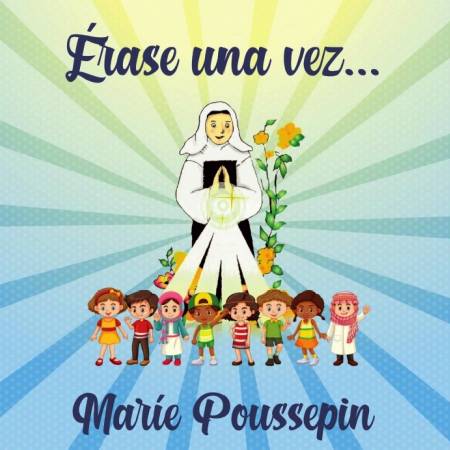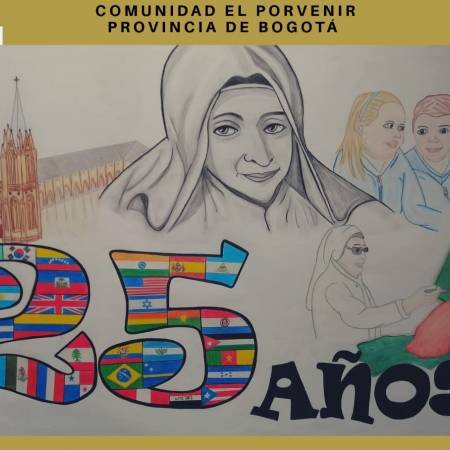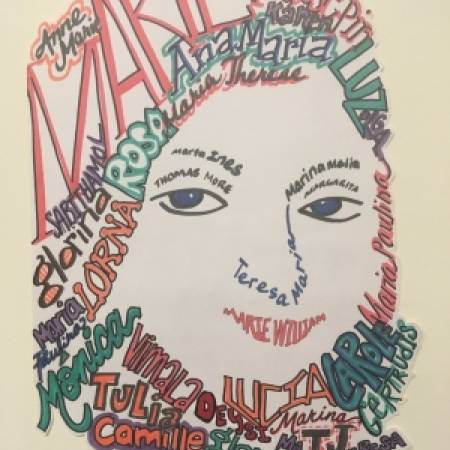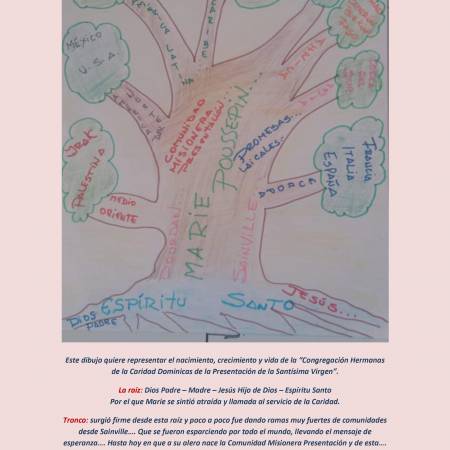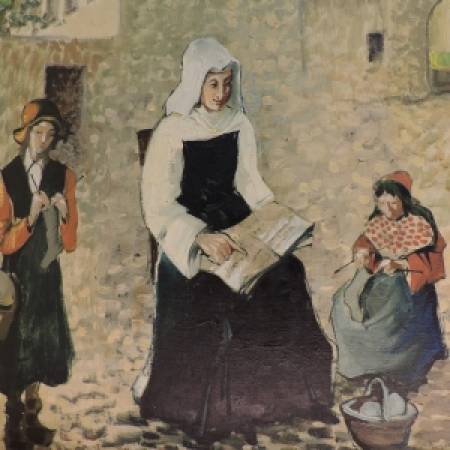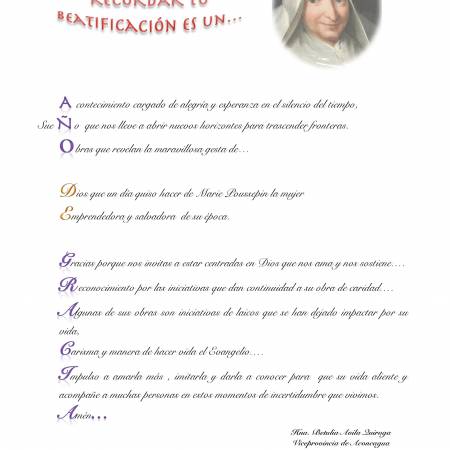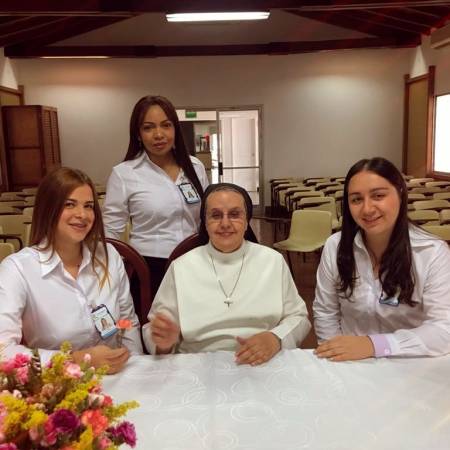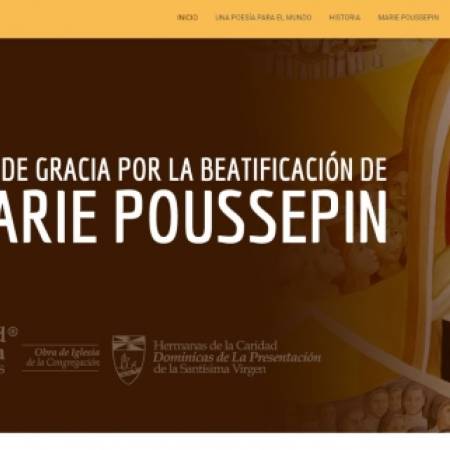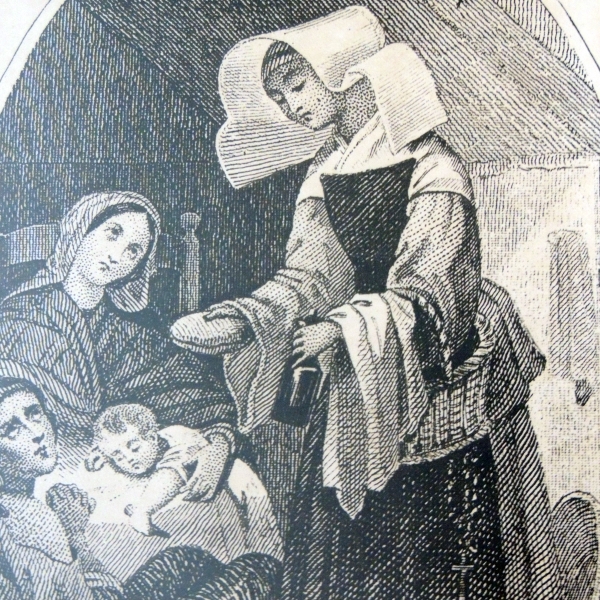Gospel Foundation
During her infancy and above all in her youth, Marie Poussepin was distinguished by her life of prayer and love for the poor. This experience will continue to unify her life in faith, hope and charity.
Her charity has its source in love of God; it is nourished by prayer, study and contemplation of the Word and it seeks only the glory of God and the good of neighbor. She expects everything from God and did all her actions with a sincere desire to please God[1]. The key to her compassion is her love, friendship and intimacy with the Lord; it renews and motivates her to go to meet her brothers and sisters in need and bring them her love and mercy. Marie Poussepin kept herself united to God and so, her preaching in turn, became good news for the poor and sick in Sainville.
Love of God shown through spiritual and corporal works of mercy towards the neighbor is the characteristic of her spiritual physiognomy. During her Beatification the church recognized the heroism of her virtues and declared her as “Social Apostle of charity”[2].
Her witness of Charity
For Marie Poussepin, her home was the first school that initiated her to the service of charity. From childhood she accompanied her mother in this ministry and continued this service to the poor and sick. The assiduous Reading of the Word of God, prayer and contemplation allowed her to find new ways and new forms of expression.
In her spiritual itinerary, she went on discovering that charity has to have a look always fixed on God and her brothers and sisters. She kept throughout her life this movement towards God and others, which gave dynamism to her charity and fidelity to her commitment. Her love for God was manifested in the exact observance of the commandments, in the practice of the evangelical counsels, in her continuous union with God and in living in the most possible way the maxims of the Gospel: “you shall love the LORD, your God, with your whole heart, and with
your whole being, and with your whole strength” and “You shall love your neighbor as yourself[3].
Charity is expressed in the encounter, hospitality and welcome, solidarity and the gift of oneself.
Her compassion followed the lifestyle of Jesus as shown in the parable of the good Samaritan: selfless and unconditional love that welcomes each person and makes him/her to be neighbor to the other, going beyond all the differences of cultures, societies or religion. Her service didn’t exclude anyone, but the poor has her preference and care: “Have no less love for the poor as for the rich, love first of all, those who have a greater need.” Her charity was the secret of her commitment all through her life, the aim of her institute, the strength of her apostolate and the cause for her concerns.
The Charity of Marie Poussepin has some characteristics: Gratuity , Just as she lived it, she recommended it for her sisters[4]; it is the fountain for renewal, change and social transformation as seen in Dourdan ; it is a means for encounter and inclusion of the poor, sick and abandoned as in Sainville; It is a factor for human promotion and social development through education and formation for work. Charity is lived in the heart of the world with all the richness and strength of community life and commitment to the mission, as seen in its missionary expansion.
The service of charity to the sick, poor and needy, the education of youth and the preaching of the Gospel belong to its essence and they cannot be separated from it.
To return to Sainville is not a simple question of history, but it enables us to be witnesses of a creative charity.
How are we living today personally and in community, this sense of gratuitous Gospel living?
Legacy to the Congregation
To give a renewed impetus to Charity during this year of grace of the Beatification, we must return to the teachings left to us by this “Social Apostle of Charity.”
We have come to Marie Poussepin’s house to live and die in the exercise of charity[5]. Charity does not limit us or condition us to one kind of work, but it forms us to a new way of being, living, being available for the mission and living with concrete actions in our daily life.
Charity is taught more by works than by words, “Charity must be the soul of the community,” the love that Jesus Christ has for men and women and not founded on family relationship or affinity[6].
The charity of Marie Poussepin is practical, generous and sacrificial. It is nourished by the encounter with Christ and contemplation and it is learned in the Gospel and lived in fraternal life and apostolic life C. 13. The intensity of contemplation is directly related to the proclamation of the Word and the service of charity. Original Vision
Charity assures unity among the Sisters themselves[7] and it leads them to cordiality, affability and mutual care; it always inspires to judge the actions of others favorably or to excuse them for the intention when their actions cannot be justified. She also gives them the value of fraternal correction and asks to announce Christ with gestures of fraternity and evangelical charity[8].
The sick, the poor, the weak, the marginalized, the displaced… are the roads where we hear the voice of Christ, “You did it for me”[9]. Her charity excludes no one. It enjoys work, is flexible and capable of breaking away from the established structures. It dares to take new ways and transcend borders; it is sensitive to the problems of the other and open to the world and its new calls.
How to proceed in this direction that renews creative charity in persons, provinces and the Congregation?
The church at different moments “exhorts us to invest on creative charity”. St. John Paul II invites the Institutes to propose anew with courage, the audacity, creativity and holiness of their founders and foundresses, that may give birth to new ways of actualizing the charism, new initiatives and new forms of apostolic charity[10]. And Pope Francis in the year of Consecrated Life (2014) insisted on not to be afraid to abandon the “old wineskins”, which means, to renew the structures that give us false protection and that condition the dynamism of charity.
Following the calls of the Church and supporting the same renewal, the 55th General Chapter reaffirmed: “to live the preaching of the Gospel, for the service of charity in the meeting of each man and woman, with whom we share our life”. And it asked “to go and meet the least and the excluded, listen to God in the clamors of the migrants, the indigenous and afros, the woman, the poor, the prisoners, the sick, the elderly, the youth, and the ecology. Let us respond with creativity to the new forms of poverty in this XXIst Century and “Carry out process of integral transformation of vulnerable groups towards a dignified and sustainable life…” keeping in mind that the methodology and actions can and must change according to the time, culture and needs of men and women of today but that at the same time they must have a Gospel impact that can transform the reality and make the kingdom of God be present.
The present circumstances and the different human situations are challenges to make the love of God be present in time and they clamor for creativity and power in our service of charity. Many are the calls and urgencies of the world, to which we cannot remain insensitive.
Where can we contemplate concretely the face of Christ and how can we reach out to the different poverties of today’s world with our service of charity?
Christ’s charity urges us: 2Cor 5: 14
Many things will be necessary to revitalize the Charism; but if there is no charity (agape), everything will be useless. Paul, the apostle reminds us of it in the hymn to charity: Even if we speak in human and angelic tongues, and have a faith that “can move the mountains”, if we lack charity everything would be as “nothing”[11].
To take the risk to practice charity, asks us to look back at the audacity of the Charity of Marie Poussepin and our sisters who throughout the past 3 centuries risked everything and opened new ways for the preaching of the Gospel and the service of charity. Perhaps today, Charity may require more creativity to redirect our actions in the light of the current problems and the needs of today’s world.
Pope Francis in Evangeli Gaudium points out 3 elements for an audacious charity:
- A Spirituality of communion that challenges us to: “imagine innovative spaces and possibilities for prayer and communion with new characteristics which are more attractive and meaningful. This calls for an evangelization capable of shedding light on new ways of relating to God, to others and to the world and of inspiring essential values”. No. 73 – 74.
- Insertion into the reality which is an urgent need, presupposes spirituality, study and contemplation that may help us to overcome the temptations that block the audacity of charity: “individualism, a crisis of identity and a cooling fervor” No. 78.
- Preferential attention to the poor: “God’s heart has a special place for the poor, so much so that he himself “became poor”. They have much to teach us”. No. 197 – 198.
Only through the audacity of charity we will become witnesses and prophets of God’s love in our world. We cannot forget that the creative charity of Sainville was born in a heart centered on God, loved by God and rooted in the love of God and neighbor.
Charity will be always needed and the fire of the charism of Marie Poussepin is required at this time, to confirm the works of charity that continue to give life in different continents through its different expressions[12].
May this year of thanksgiving to the Lord and of growing deeper in the charism, be an occasion to reaffirm the ardor of charity in the Congregation, to return to the sources and to drink and be revitalized by the original spirit.
For the Congregation, it is the time for a new imagination for our charity, knowing well that everything needs change and has different elements to be taken care of, according to the environment, country and culture.
Propose two strategies that could help us revitalize the Charism in the Congregation, Province and community?
BIBLIOGRAPHY
- John Paul II, "Crossing the thresh hold of hope” 1995.
- Benedict XVI, encyclical letter, God is love, December 25, 2005.
- Pope Francis, Apostolic letter to all consecrated persons, on the occasion of the year of consecrated life, 2014.
- Congregation for institutes of consecrated life and societies of apostolic life, walking from Christ: a renewed commitment to consecrated life in the third millennium, 2002.
- Catechism of the Catholic Church, 2nd edition. 1992.
- Marie Poussepin, the Original Vision
- Marie Poussepin, General Rules.
- The Rule of Sainville.
- Constitutions of the Dominican Sisters of Charity of the Presentation of the Blessed Virgin.
- General Chapter, “Marie Poussepin, Social Apostle of Charity”,1994.
- General Government, ”Nuestra historia se hace misión”. (Our history is mission) 2019.
[1]Original Vision
[2]Cf. Cause of the canonization of the Servant of God. Relation and votes of the congress of the theologians, Votes VI, VII, 1991.
[3]Dt. 6 : 5, Lev 19 :18
[4]Cf. R XXVI
[5]Constitutions 1
[6]The Rule of Sainville II and 2Peter 1:7.
[7]Jn 17, 20-23.
[8]Cf. R II.
[9]Mt 25:40.45
[10]John Paul II, Vita Consecrata (nº 37)
[11]cf. 1 Cor. 13:2-7
[12]Cf. General Government, “Our history is mission” 2019.


 EN
EN  ES
ES  FR
FR 





